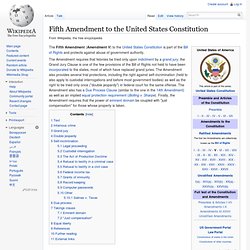

US History. American History. L'histoire des États-Unis. L'époque coloniale L'existence des États-Unis comme État indépendant ne date que de 1776 : mais l'histoire des Européens dans ce pays remonte plus haut.

Rapidement après les premières explorations, Français et Espagnols revendiquèrent les territoires nouvellement découverts. Ainsi, par exemple, de 1562 à 1565 les Français essayèrent-ils vainement de coloniser la Floride. Les Hollandais, marchant sur leurs traces, colonisèrent en 1614 l'État de New York, auquel ils donnèrent le nom de Nouveaux Pays-Bas. L'Angleterre n'était pas la seule puissance européenne présente en Amérique du Nord à cette époque. Et la France avaient leurs propres colonies sur le continent. La Révolution américaine Après la guerre que s'étaient livrés en Amérique du Nord Français et Anglais (et Anglo-américains), les treize colonies anglaises, délivrées d'un voisinage dangereux, se trouvaient en tête à tête avec leur métropole. Venait de placer les possessions américaines de la couronne.
En 1779. La guerre de Sécession . WestWingReport : Nine presidents never attended... American Stories in Easy English / American Stories in VOA Special English. There are 57 fifteen-minute MP3 files.

That is about 14 hours of listening. Bierce, Ambrose (1842-1914) Burroughs, Edgar Rice (1875-1950) Butler, Ellis Parker (1869-1937) Pigs Is Pigs (Ellis Parker Butler) Cather, Willa (1873-1947) Chopin, Kate (1850-1904) Crane, Stephen (1871-1900) The Open Boat (Stephen Crane) Folk Stories John Henry [Flash Listen and Read Along]Paul Bunyan (An American Tall Tale)Pecos Bill (An American Tall Tale) Garland, Hamlin (1860-1940) The Return of a Private (Hamlin Garland) [Listen and Read Along Machine] Collection: Declaration of Independence. Fifth Amendment to the United States Constitution. The Fifth Amendment (Amendment V) to the United States Constitution is part of the Bill of Rights and protects against abuse of government authority.

The Amendment requires that felonies be tried only upon indictment by a grand jury; the Grand Jury Clause is one of the few provisions of the Bill of Rights not held to have been incorporated to the states, most of which have replaced grand juries. The Amendment also provides several trial protections, including the right against self-incrimination (held to also apply to custodial interrogations and before most government bodies) as well as the right to be tried only once ("double jeopardy") in federal court for the same offense. The Amendment also has a Due Process Clause (similar to the one in the 14th Amendment) as well as an implied equal protection requirement (Bolling v.
Sharpe). Finally, the Amendment requires that the power of eminent domain be coupled with "just compensation" for those whose property is taken. Text[edit]